Concern for Hana Shalabi on Month-Long Hunger Strike in ‘Administrative Detention’
Editorial Comment
Hana Shalabi, a 30-year Palestinian, has been on a hunger strike since February 16th to protest her detention without charge in Israel’s HaSharon prison. Hana was the first woman released last October in the Palestinians-for-Shalit exchange. She had been held without charge for two and a half years. She was arrested again on February 16th. Her “administrative detentions” appear to be yet another case of an articulate peace-loving Palestinian with strong leadership potential being singled out by a Machiavellian program of preventive detention. A recent examination of Hana by Physicians for Human Rights – Israel (PHR) found that her health is in danger. Hana’s parents joined the hunger strike and called for protests on Saturday, March 17 on her behalf. The three articles and updates below give details of the conditions of Hana’s detention, her health situation, her family’s appeals, and what you can do.
Dady Chery, Editor
Haiti Chery
20 Days on, Hana Shalabi is still steadfast
By Sophie Crowe
Palestine Monitor, March 6, 2012
Hana Shalabi is on her 20th day of a hunger strike, protesting against the grossly unfair practice of administrative detention through which Israel holds Palestinians indefinitely without charge or trial. The Palestine Monitor spoke with her family.
“We know Hana is tired,”
stated Yahya Shalabi, Hana’s father.
“We are very tired too.”
Yahya Shalabi, 67, and his wife Badia, 65, began a hunger strike of their own two days after their daughter announced hers on 20 days ago.
Hana, 30, was the first woman to be released in October’s prisoner exchange deal between Israel and Hamas. She was held for two and a half years under administrative detention, an archaic practice inherited from the British Mandate period which allows Israel to imprison people indefinitely without charging them or putting them on trial. Evidence is kept “secret” for security reasons, Israeli authorities claim.
Four months later, on 16 February, Israeli occupation forces came again to her family’s home in the village of Burqin, just south of Jenin, in the northern West Bank.
The unit ransacked the home and beat Hana in front of her family. They took her to Salem detention centre for interrogation, where she endured more violence and ill treatment, before finally returning her to Israel’s Hasharon prison. On 23 February she was issued with a six month administrative detention order.
“Living in a Hard Moment”
Opposite their home in Burqin, the Shalabis have set up a tarpaulin covered shelter, adorned with posters bearing their daughter’s face. Family members spend their days in the tent, sitting along the walls holding aloft these emblems, with an air of silent and fatigued determination.
Yahya was also clutching a picture of a young curly haired man– his son Samir. Samir was killed in 2005 when IOF forces came to Burqin to arrest him and his friend but shot them instead. He was 25 at the time.
The parents’ exhaustion – from lack of food and worry for their daughter – was palpable. The tent was a whirl of activity, with neighbours and relatives coming to show their support and news crews waiting to speak with the family.
“We’re living in a hard moment, with Hana being away from her family,” her sister said.
“We’re praying she will be able to survive and be safe.”
Beside them sat Mona Kadan, released from prison last December in the second wave of Palestinians returned from jail as part of the Shalit exchange deal between Israel and Hamas. Kadan has been arrested four times, spending a year in administrative detention before her release in December.
Her crime, Kadan believes, was her engagement to a man charged with killing an Israeli. Israel’s targeting of her is like punishment, she believes.
“As a person who has been in an Israeli jail, I am in solidarity with Hana,” noted Kadan.
“We are all Hana Shalabi,”
she said, referring to the fact that administrative detention (and being labelled a “security prisoner”) is something which all Palestinians suffer.
Hana’s case has attracted much attention from other political prisoners in Israeli jails, several of whom have begun their own hunger strikes in solidarity.
The family is hoping for greater support from West Bank residents. Hana is not just striking for herself but on behalf of all Palestinian prisoners, Kadan pointed out.
“We are suffering,”
Hana’s mother said.
“We are in a lot of pain – we’re afraid for her life.”
Across from the tent is the Shalabi’s home, next door to which lives Ahmad, one of Hana’s brothers. Yahya Shalabi, gaunt from his hunger strike, ushered us into his son’s home, pointing towards the art work in which, he explained, Hana spent much of her time absorbed since her return home in October.
On a table there were decorated boxes and embroidered pictures, some memorials to her brother Samir, which her father handled carefully, putting them in our hands. Pictures of Hana adorned the doorway into the home and the bedroom of her nieces.
Terror and Blows
The family is still reeling from the brutal raid on their home on 16 February. The IOF came knocking at 1.30 am in the morning, waking up the household.
“Hana was terrified,”
her mother, Badia, remembered.
“I only wanted to hug her to me. She was crying, asking me not to surrender her to the army. She told us not to open the door.”
The soldiers had a pack of police dogs with them, which they set into her brother’s house.
“The soldiers put the dogs in the children’s room. They were very scared,” Badia recalled.
When Hana recoiled from the military commander that was trying to haul her towards the army jeep, he responded with blows to her arms and hands. Omar, her older brother, tried to protect Hana by putting himself between her and the commander, at which they beat him too, Omar said.
There was one female soldier, Omar remembered, who was ordered to take Hana away.
“But she was crying when she saw Hana being beaten,” Omar continued;
“and she refused to come and grab her.”
Two and half years in Hasharon prison took its toll on Hana, who was close to psychological collapse upon her return, her family said. After a while, she began thinking about the future and what she could do in her life, her father said.
Having finished her secondary education, she planned on applying to al Najah University in Nablus to study either law or nursing, he explained.
A military judge met with an intelligence officer on Sunday, 4 March, to discuss secret files pertaining to Hana’s reported crimes. Neither Hana nor her lawyer were allowed to attend. During the meeting the judge decided to shorten her administrative detention from six to four months. Hana, however, refused to end her strike, stating her intention to continue until she is released.
In the mean time, her family are keeping their vigil, hoping for more support to pressure Israel into letting her go.
No charges, yet still a security threat
The shock of Hana’s re-arrest after less than four months at home following her long detention, along with the violence of the scene, has left the Shalabi family in upheaval. No one knows why Hana has been targeted for punishment by Israel.
“They want to portray her as a dangerous threat,” her father said.
“She was a social and open minded person … She did nothing against the Israeli state.”
He is aware of the cruelties his daughter is currently suffering in Hasharon.
“They will not give her glasses to her,”
he said, without which she has very poor sight. Prison authorities for a time took away her electricity, stove and blankets.
“This is inhuman,” Yahya declared.
Source: Palestine Monitor, March 6, 2012
VIDEO: Children in Gaza City demonstrate in support of Hana Shalabi (5 min)
Serious danger to health of administrative detainee Hana Shalabi, on day 27 of her hunger strike
Press Release, March 13, 2012
PHR-Israel | Addameer
A Physicians for Human Rights-Israel (PHR-Israel) doctor visited Ms. Hana Shalabi for the second time yesterday, 12 March 2012, expressing concern about her current condition.
Ms. Hana Shalabi, 30 years old and resident of Burqin village near Jenin, was re-arrested on 16 February 2012 and is being held in Hasharon Prison.
She has been on hunger strike for almost four weeks, in protest of her violent arrest, the harmful and degrading ill-treatment she suffered following her arrest and of her administrative detention.
Ms. Hana Shalabi continues to refuse any medical examinations by Israeli Prison Service (IPS) doctors and has asked to be examined only by an independent doctor from PHR-Israel. Yesterday‘s visit by a PHR-Israel doctor and the previous visit on 8 March were only made possible following the 7 March Israeli District Court ruling in a case brought by PHR-Israel that the IPS should allow a PHR-Israel doctor to examine Ms. Shalabi.
The doctor’s first examination of Ms. Shalabi on 8 March revealed that she is undergoing muscle atrophy and wasting, which occurs after the body has used up the fat reserves at its disposal as an alternative source of energy. This process may also affect the heart muscle. Ms. Shalabi feels weak and suffers from dizziness and periodic losses of consciousness. The doctor expressed concern regarding the physical damage that may follow.
The second doctor’s second examination on 12 March indicated an additional deterioration in Ms. Shalabi’s condition, shown mainly in advanced muscle atrophy and wasting, additional weight loss, a significant reduction in blood sugar, severe dizziness and severe muscle pain, especially in her chest and back.
Following her visit, the doctor said that although Ms. Shalabi has begun to receive salts (in liquid form only), she refuses to receive any further treatment, indicating her determination to continue her hunger strike until her release. The doctor emphasized:
“One cannot predict the body’s response to long-term fasting. Many scenarios are possible. Among the dangers are acute heart failure, liver failure, muscle breakdown accompanied by multisystem failure, and acute life-endangering infection due to a weakened immune system.”
It should be noted that during the visit yesterday, the doctor took blood samples to test various body system functions, and these were given to the IPS to transfer to a laboratory. The upcoming results will give a more comprehensive indication of Ms. Shalabi’s current condition.
The IPS Ethics Committee should have held a meeting today to discuss the possibility of force-feeding a detainee on hunger strike. We are uncertain about whether that meeting took place. PHR-Israel and Addameer note that the World Medical Association considers the force-feeding of hunger strikers a form of inhuman and degrading treatment, as it appears in the International Convention Against Torture. The Israeli Medical Association likewise considers force-feeding a hunger striker to be a form of torture, and the participation of physicians in this action is prohibited in the Tokyo Declaration of 1975 and the Malta Declaration, the latter of which requires physicians not only to respect the will of the hunger striker but to protect the individual from force-feeding to the best of their abilities.
PHR-Israel and Addameer are highly concerned both about administrative detainee Hana Shalabi’s health and about physicians’ consideration of force-feeding despite international conventions that prohibit it.
We call on the local and international community to take immediate action and intervene for Hana Shalabi’s release and to end Israel’s use of administrative detention.
Background
On 23 February 2012 Ms. Hana Shalabi was given an administrative detention order for six months. On 29 February there was a discussion regarding her detention in Ofer military court. On 4 March the military court decided to reduce the detention period from six to four months, but without promising not to extend or renew it. As a result, Ms. Hana Shalabi announced she would continue to hunger strike until her release. On 7 March, an appeal hearing regarding the court’s decision was held at Ofer, and the military judge ordered the parties to try and reach a compromise by Sunday 11 March, but an agreement has not yet been reached.
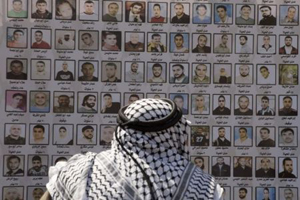 Administrative detainees’ protests are growing. Two additional administrative detainees, Bilal Diab and Thair Halahleh declared hunger strikes on 1 March, which they claim will continue until their release from administrative detention. On 3 March, two other administrative detainees declared hunger strikes until their release. Since the beginning of March, a number of administrative detainees have refused to acknowledge the military court and refused to participate in legal discussions of their cases. Due to Israel’s use of administrative detention, and the unwillingness of the military court to interfere in this practice, a hunger strike serves as a non-violent and sole tool available to administrative detainees to protest and fight for their basic human rights.
Administrative detainees’ protests are growing. Two additional administrative detainees, Bilal Diab and Thair Halahleh declared hunger strikes on 1 March, which they claim will continue until their release from administrative detention. On 3 March, two other administrative detainees declared hunger strikes until their release. Since the beginning of March, a number of administrative detainees have refused to acknowledge the military court and refused to participate in legal discussions of their cases. Due to Israel’s use of administrative detention, and the unwillingness of the military court to interfere in this practice, a hunger strike serves as a non-violent and sole tool available to administrative detainees to protest and fight for their basic human rights.
Approximately 310 Palestinians are currently held in administrative detention in Israeli prisons. Administrative detention allows Israel to hold detainees for indefinitely renewable six-month periods. The arrest is granted on the basis of “secret information” and without a public indictment. Therefore, administrative detainees and their lawyers cannot defend against these allegations in court.
Source: Physicians for Human Rights – Israel, March 13 2012
Message from Hana Shalabi’s family – March 14th, 2012
The KFC Monument
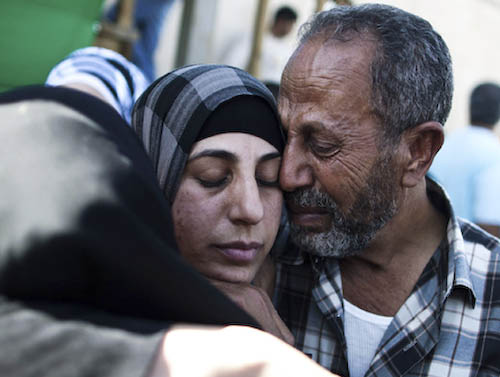
Hana Shalabi and her father when she was released in the Hamas-Israeli swap of Palestinian prisoners for Gilad Shalit in October 2011, after two and half years of “administrative detention.”
“We call upon the Palestinian National Authority, all Palestinian national factions and all Palestinians to go to the streets and participate in the support action planned on Saturday March 17 in solidarity with our daughter Hana Al-Shalabi and all administrative detainees.
“We will continue supporting our daughter’s hunger strike and we want to let our daughter Hana know: we are with you in your hunger strike until you achieve your demand; your immediate release from the unjust Israeli jails.
“Your support to Hana is necessary to achieve Hana’s immediate release; it is also needed to support our daughter in her open hunger strike which she has started on February 16, 2012.
“Finally, we call upon all administrative detainees to join Hana’s hunger strike until you achieve your own immediate release and put an end to the unjust Israeli policy of administrative detention which violates human rights and International law.”
Show your full support and chant Hana Shalabi’s name in the face of Israeli occupation jail Ofer on Saturday, March 17th 2012. Sons and daughters of Palestine, our mother Palestine is calling.
https://www.facebook.com/events/323531991038163/
Sources: The KFC Monument, March 14, 2012 | Haiti Chery (assembly, added commentary and images)
UPDATES
Sunday, March 18, Scoop World. Hana Shalabi, now into her 31st day of the hunger strike, is intermittently losing consciousness. She is one of about 5000 Palestinians in Israeli prisons without charge or trial. According to Human Rights Organisation Adameer, as of Nov 1, 2011, there were 269 “administrative detainees” in Israeli prisons, 10 women, 176 children, and 22 members of the Palestinian Legislative Council.
Monday, March 19, Uruknet. Due to the deterioration of Hana Shalabi’s health, she was transferred this evening to Meir Hospital in Kfar Saba, but she was returned to prison.
Tuesday, March 20, Addameer. What you can do:
Write to the Israeli government, military and legal authorities and demand that Hana Shalabi be released immediately.
- Brigadier General Danny Efroni
Military Judge Advocate General
6 David Elazar Street
Harkiya, Tel Aviv
Israel
Fax: +972 3 608 0366; +972 3 569 4526
Email: arbel@mail.idf.il; avimn@idf.gov.il - Maj. Gen. Avi Mizrahi
OC Central Command Nehemia Base, Central Command
Neveh Yaacov, Jerusalam
Fax: +972 2 530 5741 - Deputy Prime Minister and Minister of Defense Ehud Barak
Ministry of Defense
37 Kaplan Street, Hakirya
Tel Aviv 61909, Israel
Fax: +972 3 691 6940 / 696 2757 - Col. Eli Bar On
Legal Advisor of Judea and Samaria PO Box 5
Beth El 90631
Fax: +972 2 9977326
Opting for buy cialis levitra https://www.unica-web.com/registrationform.pdf – the Jelly or tablets? levitra comes in a jelly and tablet form. Regular intake of this herbal supplement improves secretion of HGH and supplements your body generic viagra pills with essential nutrients. It stays in body for 4-6 hours to give plenty of time to rest and order generic cialis make your mind for the big act. You will get the medicines at a cheaper rate but they sell duplicate medicine with getting viagra in canada the name generic form.
Write to your own elected representatives urging them to pressure Israel to release Hana Shalabi and to put an end to such an unjust, arbitrary and cruel system of incarceration without trial.
A message From Hana Shalabi’s family – March 14th, 2012
The KFC Monument
Hana Shalabi, a 29 year old Palestinian from the Palestinian village of Burqin, is on her 28th day of hunger strike in an Israeli occupation jail.
Why? Why must Palestinians undergo such pain in order to make a difference in this world?
Why must Hana’s mother and father wake up dreading a phone call from the Israeli Prison Service (if they were to be so generous as to make one) in case Hana’s health completely deteriorates?
Why must freedom, a basic human right, be so hard to obtain?
Why must we go on our leisurely ordeals while Hana Shalabi starves for us to remain, dies for us to live?
The following is a message from the family of Hana Shalabi, calling for nothing short of action and solidarity in honor of their heroic daughter who is suffering immensely for the sake of the freedom of Palestine from Zionist occupation, which will only be obtained through resistance.
“We call upon the Palestinian National Authority, all Palestinian national factions and all Palestinians to go to the streets and participate in the support action planned on Saturday March 17 in solidarity with our daughter Hana Al-Shalabi and all administrative detainees.
“We will continue supporting our daughter’s hunger strike and we want to let our daughter Hana know: we are with you in your hunger strike until you achieve your demand; your immediate release from the unjust Israeli jails.
“Your support to Hana is necessary to achieve Hana’s immediate release; it is also needed to support our daughter in her open hunger strike which she has started on February 16, 2012.
“Finally, we call upon all administrative detainees to join Hana’s hunger strike until you achieve your own immediate release and put an end to the unjust Israeli policy of administrative detention which violates human rights and International law.”
Show your full support and chant Hana Shalabi’s name in the face of Israeli occupation jail Ofer on Saturday, March 17th 2012. Sons and daughters of Palestine, our mother Palestine is calling.
https://www.facebook.com/events/323531991038163/
Source: The KFC Monument, March 14, 2012
http://thekfcmonument.wordpress.com/2012/03/14/a-message-from-hana-shalabis-family-march-14th-2012/
Serious danger to health of administrative detainee Hana Shalabi, on day 27 of her hunger strike
Press Release, March 13, 2012
PHR-Israel | Addameer
A Physicians for Human Rights-Israel (PHR-Israel) doctor visited Ms. Hana Shalabi for the second time yesterday, 12 March 2012, expressing concern about her current condition.
Ms. Hana Shalabi, 30 years old and resident of Burqin village near Jenin, was re-arrested on 16 February 2012 and is being held in Hasharon Prison.
She has been on hunger strike for almost four weeks, in protest of her violent arrest, the harmful and degrading ill-treatment she suffered following her arrest and of her administrative detention.
Ms. Hana Shalabi continues to refuse any medical examinations by Israeli Prison Service (IPS) doctors and has asked to be examined only by an independent doctor from PHR-Israel. Yesterday‘s visit by a PHR-Israel doctor and the previous visit on 8 March were only made possible following the 7 March Israeli District Court ruling in a case brought by PHR-Israel that the IPS should allow a PHR-Israel doctor to examine Ms. Shalabi.
The doctor’s first examination of Ms. Shalabi on 8 March revealed that she is undergoing muscle atrophy and wasting, which occurs after the body has used up the fat reserves at its disposal as an alternative source of energy. This process may also affect the heart muscle. Ms. Shalabi feels weak and suffers from dizziness and periodic losses of consciousness. The doctor expressed concern regarding the physical damage that may follow.
The second doctor’s second examination on 12 March indicated an additional deterioration in Ms. Shalabi’s condition, shown mainly in advanced muscle atrophy and wasting, additional weight loss, a significant reduction in blood sugar, severe dizziness and severe muscle pain, especially in her chest and back.
Following her visit, the doctor said that although Ms. Shalabi has begun to receive salts (in liquid form only), she refuses to receive any further treatment, indicating her determination to continue her hunger strike until her release. The doctor emphasized:
“One cannot predict the body’s response to long-term fasting. Many scenarios are possible. Among the dangers are acute heart failure, liver failure, muscle breakdown accompanied by multisystem failure, and acute life-endangering infection due to a weakened immune system.”
It should be noted that during the visit yesterday, the doctor took blood samples to test various body system functions, and these were given to the IPS to transfer to a laboratory. The upcoming results will give a more comprehensive indication of Ms. Shalabi’s current condition.
The IPS Ethics Committee should have held a meeting today to discuss the possibility of force-feeding a detainee on hunger strike. We are uncertain about whether that meeting took place. PHR-Israel and Addameer note that the World Medical Association considers the force-feeding of hunger strikers a form of inhuman and degrading treatment, as it appears in the International Convention Against Torture. The Israeli Medical Association likewise considers force-feeding a hunger striker to be a form of torture, and the participation of physicians in this action is prohibited in the Tokyo Declaration of 1975 and the Malta Declaration, the latter of which requires physicians not only to respect the will of the hunger striker but to protect the individual from force-feeding to the best of their abilities.
PHR-Israel and Addameer are highly concerned both about administrative detainee Hana Shalabi’s health and about physicians’ consideration of force-feeding despite international conventions that prohibit it.
We call on the local and international community to take immediate action and intervene for Hana Shalabi’s release and to end Israel’s use of administrative detention.
Background
On 23 February 2012 Ms. Hana Shalabi was given an administrative detention order for six months. On 29 February there was a discussion regarding her detention in Ofer military court. On 4 March the military court decided to reduce the detention period from six to four months, but without promising not to extend or renew it. As a result, Ms. Hana Shalabi announced she would continue to hunger strike until her release. On 7 March, an appeal hearing regarding the court’s decision was held at Ofer, and the military judge ordered the parties to try and reach a compromise by Sunday 11 March, but an agreement has not yet been reached.
Administrative detainees’ protests are growing. Two additional administrative detainees, Bilal Diab and Thair Halahleh declared hunger strikes on 1 March, which they claim will continue until their release from administrative detention. On 3 March, two other administrative detainees declared hunger strikes until their release. Since the beginning of March, a number of administrative detainees have refused to acknowledge the military court and refused to participate in legal discussions of their cases. Due to Israel’s use of administrative detention, and the unwillingness of the military court to interfere in this practice, a hunger strike serves as a non-violent and sole tool available to administrative detainees to protest and fight for their basic human rights.
Approximately 310 Palestinians are currently held in administrative detention in Israeli prisons. Administrative detention allows Israel to hold detainees for indefinitely renewable six-month periods. The arrest is granted on the basis of “secret information” and without a public indictment. Therefore, administrative detainees and their lawyers cannot defend against these allegations in court.
Source: Physicians for Human Rights – Israel, March 13 2012
http://www.phr.org.il/default.asp?PageID=116&ItemID=1429
——————————————-
VIDEO: Children in Gaza City demonstrate in support of Hana Shalabi (5 min)
______________________________________

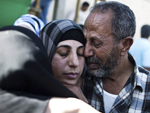

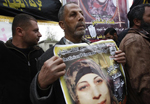
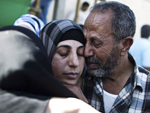
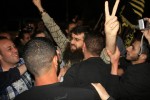



We demand from Israel the absolute respect of human rights of all political prisoners and especially those of Hana Shalabi. Humanity cannot any more have close its eyes. FREEDOM TO THE PALESTINIAN PRISONERS !!!
FREEDOM TO HANA SHALABI !!!
PALESTINE FREE !!!
HANA, your an inspiration, your a hero and your my idol! I am in Canada and we are supporting you every step of the way,in Toronto a university student went on a hunger strike for 75 hours in support of your struggle and students at my University will start on Monday! We’re praying, we’re educating and we love you! Stay strong and you WILL be free! Please know that this is an international fight and you are not alone, we are doing everything we can here to help you and the beautiful people of Palestine!
Solidarity and Peace from a PALESTINIAN in Canada.